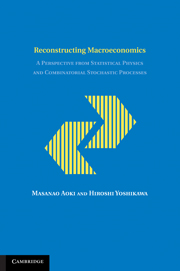 Reconstructing Macroeconomics
Reconstructing Macroeconomics Book contents
- Frontmatter
- Contents
- Preface by Masanao Aoki
- Preface by Hiroshi Yoshikawa
- 1 Introduction: A New Approach to Macroeconomics
- 2 The Methods: Jump Markov Process and Random Partitions
- 3 Equilibrium as Distribution: The Role of Demand in Macroeconomics
- 4 Uncertainty Trap: Policy Ineffectiveness and Long Stagnation of the Macroeconomy
- 5 Slow Dynamics of Macro System: No Mystery of Inflexible Prices
- 6 Business Cycles: An Endogenous Stochastic Approach
- 7 Labor Market: A New Look at the Natural Unemployment and Okun's Law
- 8 Demand Saturation-Creation and Economic Growth
- 9 The Types of Investors and Volatility in Financial Markets: Analyzing Clusters of Heterogeneous Agents
- 10 Stock Prices and the Real Economy: Power-Law versus Exponential Distributions
- References
- Author Index
- Subject Index
- Other books in the series (continued from page iii)
5 - Slow Dynamics of Macro System: No Mystery of Inflexible Prices
Published online by Cambridge University Press: 08 August 2009
- Frontmatter
- Contents
- Preface by Masanao Aoki
- Preface by Hiroshi Yoshikawa
- 1 Introduction: A New Approach to Macroeconomics
- 2 The Methods: Jump Markov Process and Random Partitions
- 3 Equilibrium as Distribution: The Role of Demand in Macroeconomics
- 4 Uncertainty Trap: Policy Ineffectiveness and Long Stagnation of the Macroeconomy
- 5 Slow Dynamics of Macro System: No Mystery of Inflexible Prices
- 6 Business Cycles: An Endogenous Stochastic Approach
- 7 Labor Market: A New Look at the Natural Unemployment and Okun's Law
- 8 Demand Saturation-Creation and Economic Growth
- 9 The Types of Investors and Volatility in Financial Markets: Analyzing Clusters of Heterogeneous Agents
- 10 Stock Prices and the Real Economy: Power-Law versus Exponential Distributions
- References
- Author Index
- Subject Index
- Other books in the series (continued from page iii)
Summary
The standard approach such as RBC is based on the premise that the microeconomic behavior of the optimizing agent mimics dynamics of the macroeconomy. In Chapter 1, we explain that this premise is incorrect, and that the macro and micro behaviors are fundamentally different.
In this chapter, we focus on a particular aspect of the macroeconomy, namely the speed of adjustment. The premise of the standard approach is that rational economic agents must respond quickly to any change in economic environment. And it is taken for granted that this micro behavior should translate itself into the macroeconomy. Thus, one expects that the speed of adjustment in the economy as a whole is also fast in normal conditions. In this way, the standard approach does not make any distinction between the speed of adjustment of micro agents and that of the macroeconomy.
Let us take up prices as an example. Since the publication of Keynes's General Theory (1936), “inflexibile” or “rigid” prices have been always a focal point of macroeconomics. Modigliani (1944), one of the first economists, coined the proposition that what distinguishes Keynesian economics from neoclassical economics is the assumption of inflexible prices (to be precise, rigid nominal wages in his case).
Many economists take inflexibility of prices as a sign of irrationality. Aside from monopoly power or institutional barriers such as regulations, healthy market forces should make prices flexible. In this chapter, we will explain that slow changes in prices are a necessity in the macroeconomy.
- Type
- Chapter
- Information
- Reconstructing MacroeconomicsA Perspective from Statistical Physics and Combinatorial Stochastic Processes, pp. 121 - 147Publisher: Cambridge University PressPrint publication year: 2006


